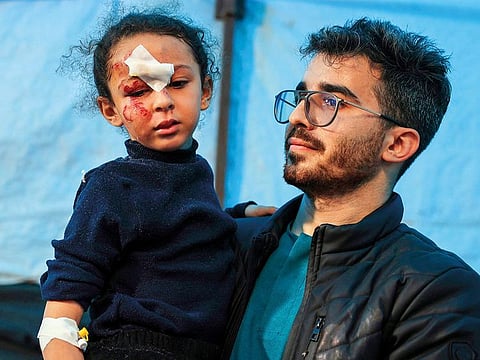The surreal impact of the Gaza War
Palestinians have become not crushed but ennobled by the spite of their occupiers

If human misery had eyes, what do we see when we look into them?
Were we, say, to view the image of a dead child, dug up from under the rubble of a bombed-out building in Gaza, being carried away for burial on the arms of a sibling, who is also a child — an image replicated on our screens over and over in recent weeks — what do we see reflected there?
And “we” here excludes those in our midst who are content to merely aestheticise suffering — and leave it at that — thus implicitly aggrandising their own sense of moral rectitude, with no cost to themselves.
The “we” here are those who feel organically twinned with the suffering of the people of that little strip of land called Gaza, who feel numb at the core of their human being, as they contemplate an image like that, knowing all the while that to truly comprehend it they have to abstract it in their mind — to discard established habits of seeing and thinking, which is the only way to understand an image that is beyond all rational understanding.
We know how unimaginably beyond all that rational understanding the impact of the Gaza war, now in its third month, has been on Gazans, trapped as they are in their tiny exclave — once a prison camp, now a death camp — where unspeakable loss of life, destruction, displacement, starvation and other forms of deprivation have become deadly comrades with infectious diseases, which are known to thrive in places like Gaza today, where there are mass movement of people, overcrowding, poor sanitation, inadequate nutrition and lack of clean water and health services.
Also Read: On Gaza, America stands globally isolated
What is so utterly surrealistic about this war is not just that the infliction of misery on the civilian population has become a strategy of Israel’s military campaign, but that Israel’s leaders truly expect the world to seriously consider, even accept, their rationalisations of that strategy.
Meanwhile, well over two million people, displaced from their home and acre — and to displaced people everything in their lives is displaced, with no haven for them between earth and sky — sit in Gaza, victimised by forces beyond their ability to stand up to, and we, twinned with their suffering, sit here, safe, feeling impotent, helpless and frustrated at our inability to mend their pain.
Dantean pit of human degradation
Sadly, for Gaza as for West Bank Palestinians, misery has been the norm and equity the exception, living as they have done over the last 56 years as an occupied people, with a boot over their collective neck and a gun cocked and ready to shoot at their head. Call that life as a landscape at the Dantean pit of human degradation.
Yet, in the face of this stone-cold, congenital malice — malice that seeks to reduce the humanity of an occupied people to a fragment — Palestinians appear to have become not crushed but ennobled by the spite of their occupiers. Surely, their mere survival as a Palestinian people attests to that.
Look, if this war started as a military campaign against Hamas, it sure as heck now looks like a war against the people of Gaza.
Informed analysts, who have written extensively on Israel’s plan for the depopulation (“thinning out”, in the words Benjamin Netanyahu) of Gaza, leading to the expulsion of its residents to Egypt, are not in short supply. Many Israeli politicians have openly called for just that. Some among them have an even more hideous vision of what to do with the two million-plus inhabitants of the Strip.
“The whole Gaza Strip needs to be empty. Flattened. Just like in Auschwitz. Let no one reside in the Gaza Strip for all the world to see,” a piece in the Worldview section of the Washington Post on Wednesday quoted David Azulai, mayor of Meluta, a town in northern Israel, as saying, in an echo of the sentiment of many Israeli politicians who are these days openly calling for mass murder in Gaza, similar to the one that had been committed in Auschwitz, the Holocaust’s most notorious concentration camp.
Meanwhile, the Security Council of the United Nations, the world’s leading decision-making body, was made by the US to bicker for three days over whether to substitute “suspension of hostilities” for “ceasefire” in Gaza.
Or was it the other way round? For those of us weary souls who have internalised the otherworldly pain of Gazans, it’s all six or half dozen of the other.
— Fawaz Turki is a noted academic, journalist and author based in Washington DC. He is the author of The Disinherited: Journal of a Palestinian Exile
Sign up for the Daily Briefing
Get the latest news and updates straight to your inbox



